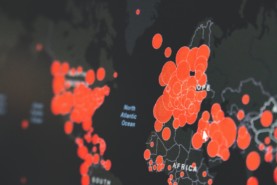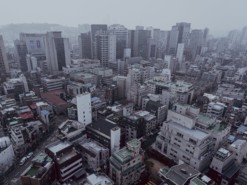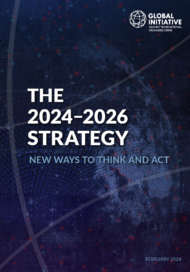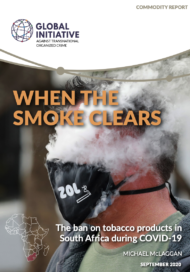Posted on 25 Sep 2020
We are fast approaching the tenth anniversary of the Tunisia Revolution that sparked the Arab Spring and toppled long-reigning autocrats in the Middle East. Now, however, countries all over the world – even wealthy ones like the United States – are experiencing mass protests against poor governance and police brutality – one of the issues that reportedly drove street vendor Mohamed Bouazizi to set himself on fire in Tunisia a decade ago.
The latest country is Colombia, where thousands of people took to the streets to protest the killing of Javier Ordóñez, a taxi driver who was studying to become a lawyer, while in police custody in Bogotá on 9 September. A video shows two police officers repeatedly using a stun gun against his body for more than two minutes. Over the following days, protests resulted in dozens of police stations being set on fire and 10 people killed.
Colombia’s experience is emblematic of protests around the world that have either targeted police officers or led to violence between the two sides – often both at the same time – as the world fights a deadly pandemic. The police have been – even more than before – the most visible aspect of the state in low-income and socially marginalized urban areas where other state institutions are scarce. Furthermore, the pandemic’s economic impact is further straining governance capacities in low-income areas – especially the ability of governments to provide services. This leaves police officers facing a gathering storm of unrest related to governments’ failures in ruling their own countries, and represents an opening for organized-crime groups to provide protection and economic and social welfare.
In Colombia, armed groups – including both organized crime and guerrillas that control the country’s profitable illicit economies – have exploited state weaknesses during the pandemic to impose their own rules. Punishments for disobeying the rules (including curfews, quarantine, restrictions to people’s movements in and out of communities and businesses’ opening hours) include death. Interestingly, Colombia’s High Commissioner for Peace Miguel Ceballos accused the National Liberation Army (ELN) and FARC splinter cells of organizing the violent protests against police stations in an ‘attempt to affect the security of the city’s neighbourhoods’. The statement was met with scepticism, most prominently from Bogotá’s mayor, Claudia López, who questioned: ‘If they knew about it, why didn’t they prevent [it]?’
The political controversy should not distract from the urgent challenge posed by organized crime and other armed groups terrorizing communities with their draconian rules. This goes well beyond Colombia – gangs in Cape Town and Rio de Janeiro have increased their ties with low-income communities by responding to the pandemic when the state did not.
This forms a dangerous recipe for the declining legitimacy of governments: police forces increasingly resorting to violent repression against anti-government protests, while criminal groups replace the state in responding to the pandemic. In both cases, the police are left as the policy tool of last resort to re-impose ‘order’ in marginalized urban areas: ‘order’ that often comes at a lethal price for the inhabitants.
Police on the frontlines of protests
Demonstrations declined sharply across the world in mid-March and gradually began to rise again from April onwards, driven by governments’ handling of the pandemic and assistance measures. Police have been involved in clashes or heavy-handed repression during recent protests in Nigeria, Kenya, Lebanon, Chile and the US. In the US, the nationwide protests of recent months were also sparked by police violence: the killing of a black man while in police custody in Minneapolis.
In Nigeria, the National Human Rights Commission reported 18 killings by security forces during the first two weeks of lockdown in March – more than the number of people who died from COVID-19 during that period. Then, in May, an officer was accused of killing a 16-year-old girl after opening fire at a bus driver for violating a curfew. In early August, dozens of protesters were detained by police in anti-government demonstrations under the banner of a #RevolutionNow movement. At the other side of the continent, police teargassed a small and peaceful gathering in Nairobi, Kenya, protesting against alleged corruption and theft of supplies destined for COVID-19 relief by officials in the state-run Kenya Medical Supplies Authority.
In Lebanon, the enormous explosion that killed 200 people and left a staggering 300 000 homeless on 4 August sparked major anti-government protests. The Lebanese government resigned a week later, with then-prime minister Hassan Diab admitting that ‘this disaster is the result of chronic corruption,’ in reference to the authorities’ failure to dispose of 2 750 tonnes of ammonium nitrate stored in the port. A few days after the blast, it was the police – and in some places the army – who stood on the way of angry protesters trying to invade the parliament building (and many other government buildings), resulting in more than 700 people injured.
The grievances these protesters are aiming to address relate directly to states’ governance – as Francis Fukuyama puts it, ‘a government’s ability to make and enforce rules, and to deliver services’. These grievances are, however, not new: governance has been de facto an abandoned project in several low-income urban areas of the developing world long before the pandemic hit. Now, however, the toll that this neglect has taken on the police – usually the only face of the state visible to marginalized urban populations – is snowballing into a global crisis of trust.
Governance getting worse, not better
The economic impact of COVID-19 will lead to an even larger gap between informal urban areas and the state, as well as more work for the police in suppressing protests or persecuting (instead of preventing) gangs, militias and other violent actors who step up to provide services. As Melinda Gates stated during the launch of a report on global development, the ‘pandemic has magnified every existing inequality in our society’. The report showed a 7% increase in extreme poverty in just a few months, pointing out that earnings of informal workers in Africa declined more than 80% in the first month of the pandemic – which is bitterly ironic, as African countries have been less severely affected by the virus itself.
A deteriorating fiscal situation in many countries and a global economic slowdown will lead governments to cut back on infrastructure investment and public-service provision – a shift that will particularly impact low-income urban areas already low down on the priority list for such services.
The current wave of street protests take aim at a wide array of grievances towards governments and political elites – frequent issues include high-level corruption, inefficient public administration and police violence. But many of these challenges are most acutely felt in large urban areas, where mobilized and well-connected civil-society groups tend to cluster. Furthermore, some of the hardest-hit communities – such as the informal workers mentioned in the Bill and Melinda Gates Foundation’s report – are concentrated precisely in the urban hotspots where relations with law-enforcement agencies are most contentious. A recent study by the Organisation for Economic Cooperation and Development has shown that ‘capital regions or other metropolitan regions show a relatively higher risk of job disruption than other regions’. The World Bank says that many of the 100 million ‘new poor’ due to the pandemic’s impact ‘will be people living in cities and who are self-employed, mostly working in the informal sector’. Furthermore, municipal governments are estimated to face a decline in revenues of 15% to 25% next year, ‘making it difficult to maintain current levels of service delivery, let alone invest in improving slum areas’.
As governments and international donors shake the dust from this crisis and try to mitigate its worst after-shocks, recent evidence points to urban governance as a top priority. Take Lebanon as an example: the protest movement’s drivers there go beyond urban governance, but an important item in the long list of grievances has been the bad state of its cities. A popular tactic of recent protests has been the occupation of privatized spaces in cities such as Beirut and Tyre, where parks and recreational public areas are rare. Another refreshingly new trend is the mobilization of volunteers to clean up the streets – a further jab at an inefficient political elite that had turned Beirut’s streets into rotting waste dumps during the infamous 2015 ‘waste crisis’ caused by the closure of a major local landfill.
The way ahead goes beyond police reform
As popular discontent towards political elites grows due to the pandemic’s economic fallout, cities will be hit hardest. The urban-security sector, mostly comprising police forces theoretically entrusted with handling day-to-day street crime, will be on the front line. This points to potentially frequent repeats of the scenes observed in Bogotá, Nairobi, Lagos and Minneapolis, amplifying the rift between low-income communities and law-enforcement agencies.
This effect of the pandemic on urban governance has important implications for policymakers around the world. As protesters rightly call for police reform, it is important to remember the inseparable connection between urban security and broader service provision. Former security secretary of Rio de Janeiro, José Mariano Beltrame, pressed for almost a decade for his government colleagues to implement more comprehensive service provision and infrastructure in favelas to complement his ambitious pacification programme (which involved permanent police bases in areas previously controlled by criminal groups). Despite impressive achievements in reducing violence between 2008 and 2013, the programme gradually lost public trust as socio-economic improvements failed to materialize and police officers were seen as ineffective. Colombia itself implemented a successful data-based community-oriented police programme over the past decade, known as ‘policing by quadrants,’ emphasizing regular contact between officers and communities within specific urban quadrants (areas comprising neighbourhoods or parts of them). But the recent protests there make it clear that police reform by itself is not sufficient.
Recent protests lay bare the difficult reality for numerous cities grappling with police violence: change on this front is also dependent on addressing numerous governance failures – a process that will require expenditure of political capital and financial resources at a time of global turbulence. Parallel to this weakening of government capabilities and police legitimacy, organized crime and other types of armed groups have provided some services, supplies and enforced curfews or lockdowns in marginalized communities. This process – which the GI-TOC is monitoring closely – might increase pressure on governments to counter illicit (and often predatory) forms of governance. However, the temptation to use the police for repressive measures – both against crime and protests – may remain strong and further inflame urban societies.



